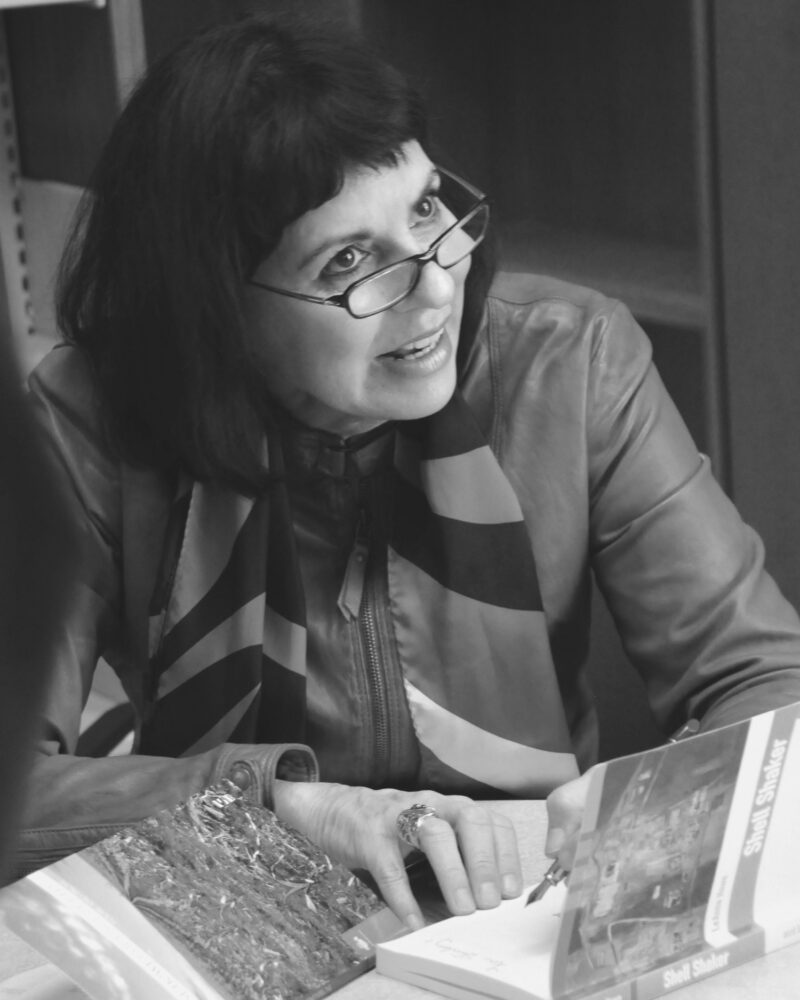Winter 2021
“Call Me Shakbatina”
LeAnne Howe’s Shell Shaker
Published: November 30, 2021
Last Updated: May 11, 2023

Photo by John Fancher, Courtesy of Aunt Lute Books
LeAnne Howe.
I would like to acknowledge that 64 Parishes publishes on the traditional, ancestral, unceded territory of the federally recognized Chitimacha, Coushatta, Tunica–Biloxi, and Jena Band of Choctaw tribes, as well as the following state-recognized tribes: Adai Caddo, Choctaw–Apache, Four Winds Cherokee, Isle de Jean Charles Band, Natchitoches, United Houma Nation, Bayou Lafourche Band, Clifton Choctaw, Grand Caillou/Dulac Band, Louisiana Band of Choctaw, and the Pointe-au-Chien Tribe.
If only acknowledging history’s injustices were this easy. Land acknowledgements have been embraced by Native organizations and alternatively dismissed as woke white tokenism by critics. Non-Indigenous peoples, myself included, can undoubtedly do more, whether it’s giving attention to Indigenous causes with our time, money, and votes, or, if lovers of the written word, our valuable reading time. And while the shelf of Indigenous Louisiana fiction is slim, hidden gems await.
One notable novel is LeAnne Howe’s Shell Shaker (2001), which pointedly opens with a sentence written in Choctaw, while daringly echoing the first line of Moby Dick: “Ano ma Chahta sia hoke oke. Call me Shakbatina, a Shell Shaker.” The setting is 1738, a time of French colonial expansion, in the Choctaw town of Yanàbi, in the area now called Kemper County, Mississippi. Shakbatina tells the story of Grandmother, the original Shell Shaker, or ceremonial Choctaw peacemaker known as an Inholahta, who must contend with war with the neighboring Chickasaws and the imminent arrival of Hernando de Soto—and all the horrors to follow. Only an Inholahta, a Choctaw woman gifted in the art of negotiation and mediation, can ensure the welfare of her people, by participating in a ceremonial dance involving the shaking of turtle shells.
Howe picks up her story in 1991, with the three Billy sisters, descendants of Shakbatina and members, like the author, of the Choctaw Nation of Oklahoma. Auda Billy, an Inholahta who now shakes with evaporated milk cans instead of shells, stands falsely accused of murdering her former lover-turned-boss, the Choctaw Nation chief, Redford McAlester. Hundreds of miles away, her sister Tema, a touring stage actor, hears a malevolent, spectral voice hiss out from the darkened theater seats. Hatak abi, it says in Choctaw: mankiller. Word of the crime soon reaches a third sister, Adair, who lives in New Orleans, where “so much Choctaw history occurred,” Howe writes. “Yet there remains no trace of her people.” The siblings convene on the Choctaw headquarters of Durant, Oklahoma, to save their sister’s life.
Howe artfully weaves Choctaw history, culture, and language into a who-done-it plot. Flashing back to the eighteenth century, she tells how violence often greeted the tribe, despite the best efforts of the Inholahta. Jean-Baptiste Le Moyne de Bienville enlisted the Choctaws as hired muscle to combat the English empire and their Indigenous allies. A century after Bienville’s reign, “the Choctaws were the first tribe to be removed from our ancient homelands,” Howe writes. The United States government evicted over 15,000 tribal members—three-fourths of the total Choctaw population—from their Mississippi River valley homelands to present-day Oklahoma. (Today, an objectionable French Quarter statue portrays the “Father of New Orleans” looming over a prime example of the generic Indian as rendered by the White Supremacist School of American Art: gloomy, submissive, and wielding a peace pipe.)
Like any good mystery novel, Shell Shaker is a touch convoluted and more than slightly implausible. There’s a subplot involving the Choctaws’ astonishing and largely forgotten ties to the Irish. In 1847, at the height of the Great Famine, the Choctaw Nation sent $170 to feed Ireland’s starving poor. (Nearly two centuries later, many of the donations to a COVID-19 food relief fund benefitting Indigenous families—totaling $7.5 million at the time of writing—have come from Ireland.)
There are outrageous but fun characters like Divine Sarah, an ancient woman who may or may not be a porcupine spirit inhabiting the body of French actress Sarah Bernhardt while surreptitiously living in a Choctaw nursing home. Divine Sarah assists the sisters’ plight by explaining that McAlester is the reincarnation of a previous Choctaw chief named Red Shoes who is funneling money to the Irish Republican Army via the Mafia. To banish Red Shoes’s evil soul, the sisters must bury McAlester’s body near Nanih Waiya, a Mississippi earthwork mound sacred to the Choctaws.
Spanning centuries and stretching the breadth of the Choctaws’ lands—precolonial, colonial, and present day—Shell Shaker becomes a land acknowledgement in novel form. Howe’s story captures a time and place before Louisiana and Mississippi statehood, before territorial establishment, before those names and lines on a map existed at all. Shell Shaker belongs to the literary canons of each state because it reminds readers of who came before, what problems still remain, and what the future has to say.
“Hatak okla hut okchaya bilia hoh-illi bila,” Shakbatina intones early in the novel. “The people are ever living, ever dying, ever alive!”
Rien Fertel lives in Bulbancha, Choctaw for “place of many tongues,” the name for the precolonial site of New Orleans. He has donated his fee for this column to the Navajo & Hopi Families COVID-19 Relief Fund.
